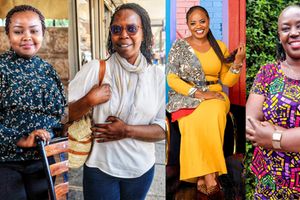
(From left) Dr Varsha Vekaria-Hirani, Patricia Kombo and Caroline Njambi Kamau.
Despite the availability of modern products, some traditional child-rearing practices endure. Kangaroo care, breastfeeding, and using the elbow to check bathwater temperature remain popular among parents.
Gone are the days when young parents solely relied on intuition, advice from elders, and dog-eared parenting books. Today’s parents are armed with gadgets and apps designed to tackle everything, from sleepless nights to safety concerns. From sound machines that mimic womb noises to wearable pumps that free up a mom’s schedule, modern parenting tech promises to ease the chaos of raising children.
These tools are more than conveniences—they’re lifelines for parents navigating the unpredictable terrain of early parenthood.
Patricia Kombo: A blend of tradition and technology
Patricia Kombo, a mother of two, Caroline Kamau, founder of Totoz World Kenya, and Dr Varsha Vekaria-Hirani, Consultant Pediatrician, share with Lifestyle their views about parenting and technology.
Patricia Kombo: A blend of tradition and technology
“Parenting is more than just tools—it’s about being present and building a connection with your child,” says Patricia, 28, a mother of two.
When she had her first child at 20, she relied solely on what she had learned from family and the older women around her.
“There was no guidance from technology—everything felt like trial and error,” she recalls.

Patricia Kombo, a mother of two praises technology in parenting.
With her second child, however, Patricia embraced technology, making her parenting journey more informed and manageable. A pivotal moment was when her second baby developed high bilirubin levels shortly after birth and was admitted to the pediatric intensive care unit.
“The doctor told me my baby needed a blood exchange and close monitoring. At first, I used a manual pump, but it was so exhausting. My sister suggested an electric pump, and it completely changed my life,” Patricia explains.
The electric pump allowed her to express milk efficiently, even during late hours.
“It gave me the freedom to rest while still ensuring my baby was fed. I could pump while scrolling through my phone or even while sitting in the hospital,” she says. However, Patricia acknowledges that while tools like electric pumps are convenient, they can sometimes interfere with bonding.
“When you use a bottle instead of breastfeeding directly, you miss that skin-to-skin connection,” she notes.
Beyond breastfeeding, Patricia has used a nasal aspirator kit to clear mucus, a water thermometer for safe bathing, and a baby bathing set for convenience. She also relied on a pregnancy-tracking app to monitor her baby’s growth during pregnancy.
“Technology helped me, but I made sure it didn’t replace the personal time we spent together,” she adds.
Parenting with technology, she emphasises, requires mindfulness.
“It’s easy to get carried away and let gadgets do all the work. But at the end of the day, it’s the human touch that matters most,” Patricia concludes. Her story highlights how blending tradition with innovation can create a balanced approach to modern parenting.
Caroline Jambi Kamau, founder of Totoz World Kenya
Caroline, a 35-year-old mother of two, is the founder of Totoz World Kenya. She is reshaping how parents shop for their little ones. With three thriving branches in Bazaar Moi Avenue, Utawala’s Eastern Bypass, and Nyali, Caroline has created a haven for parents seeking quality and convenience under one roof.
“I wanted moms to come and have everything under one roof without moving to 10 or more shops,” Caroline explains.
Her personal experience as a first-time mother inspired her to establish Totoz World. “Shopping for my firstborn 10 years ago was a struggle. The options were limited to Biashara Street or online, which back then, wasn’t widely embraced.”
From baby carriers and diaper bags to pregnancy pillows and feeding chairs, Totoz World offers a wide array of products catering to modern parenting needs. The shop’s inventory reflects Caroline’s understanding of shifting trends, blending traditional practices with innovative products.
For instance, items like floor seats and electric swings have replaced older, makeshift solutions. “Previously, moms would arrange blankets around a basin to support their babies,” she shares. “Now, products like floor seats train babies to sit, and electric swings soothe them automatically.”
Modern products such as feeding chairs and strollers have transformed child-rearing in Kenya.
“They’ve made parenting easier, especially for moms with toddlers and newborns. The safety straps on feeding chairs and the mobility offered by strollers ensure both convenience and safety,” Caroline observes.
The business has also embraced the rise of online shopping, with 90 percent of its customers ordering from the comfort of their homes.
“We deliver countrywide and even beyond,” she notes. The demand for baby products has surged, fueled by increased internet usage, social media influence, and the entry of global brands.
Despite the availability of modern products, some traditional child-rearing practices endure. Kangaroo care, breastfeeding, and using the elbow to check bathwater temperature remain popular among parents.
“While we sell water thermometers and nasal aspirators, many parents still prefer traditional methods,” Caroline says, and acknowledges that first-time parents are often drawn to new technologies.
Dr Varsha Vekaria-Hirani, Consultant Pediatrician
Dr Varsha has seen firsthand how technology has reshaped the landscape of parenting.
“Parenting today is nothing like it was a generation ago,” she begins.
“In the past, parents and guardians leaned heavily on advice from family members, friends, books, and cultural traditions to guide their parenting decisions. It was a shared effort, deeply rooted in community and face-to-face interactions.”
“But now, parents are turning to blogs, expert articles, and social media platforms like TikTok for advice and ideas. Technology has opened a world of resources, but it has also changed how families function.”
Dr Varsha notes that many modern parents now monitor their children’s activities using baby monitors and apps. While such tools offer unparalleled convenience and peace of mind, she is quick to caution that the family dynamic has also evolved. “Communication is easier with technology—parents and children can connect through messages or video calls—but the common practice of face-to-face conversations is fading. Screen time has increased for everyone, and it’s affecting how families bond.”

Dr Varsha Vekaria-Hirani, Consultant Pediatrician advises parents to avoid over-relying on technology
For parents of infants and toddlers, baby monitors are indispensable. Dr Varsha highlights their importance, saying, “Audio, video, or Wi-Fi-enabled baby monitors give parents real-time updates on their child’s safety. It’s an incredible way to ensure peace of mind, especially for new parents navigating sleepless nights.”
She also mentions the growing array of health apps and gadgets designed to track a child’s medical needs.
“Tools like the CDC or UNICEF child health and development trackers are excellent for identifying abnormalities early. Baby feed logs can help parents establish feeding schedules, while devices like pulse oximeters are lifesavers for children with respiratory conditions like asthma. Wearable heart rate and blood pressure monitors are also incredibly useful.”
She also notes that technology has also revolutionised early learning. In schools, interactive whiteboards have replaced traditional chalkboards, enhancing student-teacher engagement. She is particularly excited about STEM (Science, Technology, Engineering, and Mathematics) activities that incorporate robotics.
“These tools nurture problem-solving and critical-thinking skills from a young age,” she explains. “Even at home, parents can encourage cognitive development with educational games, puzzles, and collaborative tools like Google Docs for group projects.”
However, she stresses the importance of managing screen time.
“Apps like Screen Time for iOS, Microsoft Family, or Google Family Link help parents regulate how much time their children spend on devices. The key is to set realistic goals and build positive digital habits early.”
Dr Varsha’s eyes light up as she discusses gadgets that make daily parenting tasks more manageable. “There are smart sound machines that promote better sleep hygiene and gentle rocking bassinets that soothe babies to sleep. Feeding, sleeping, and diapering logs are also popular—they send reminders about feeding times or diaper changes, making life a little easier for busy parents.”
The hidden costs of technology
Despite its benefits, Dr Varsha warns against over-relying on technology in parenting.
“The downside is significant,” she says with concern.
“Children’s social skills are declining, mental health issues are rising, and the art of face-to-face interaction is being lost. Parents are becoming more ‘absent,’ even when physically present, as they get caught up in their devices. This lack of emotional support and guidance has long-term implications for future generations.”
How then can parents strike a balance? Dr Varsha recommends blending modern tools with timeless practices.
“Encourage family time, outdoor play, and bedtime stories,” she advises. “Create screen-free zones during meals or before bedtime. And remember, according to the American Academy of Pediatrics, children under two shouldn’t have screen time at all, and those older than two should be limited to an hour a day.”
She also emphasises the importance of supervision to prevent exposure to cyberbullying or inappropriate content. “Parenting is about finding harmony—giving children the independence they need while ensuring their safety.”
Dr Varsha envisions a future where artificial intelligence and virtual assistants play a more significant role in parenting. “AI-powered tools will make education more interactive and personalised,” she predicts. “The possibilities are endless.”
She concludes saying, “I know there is a lot of technology out there, but not all of it is necessary. Before you buy that latest gadget or subscribe to an app, talk to your pediatrician. Together, we can figure out what’s truly helpful in your parenting journey.”
wonyando@ke.nationmedia.com








